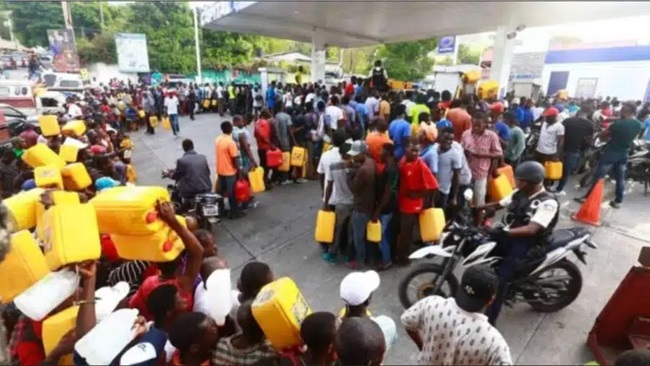Douala: Escalating fuel prices are hurting!
For years now, the cost of living around the world has left many people in difficult financial times. The rising housing cost in the country has left many people around the world homeless while escalating food and oil prices have left many hungry and desperate. To gain a better understanding of the tough financial times in which the increasing fuel prices have dumped Cameroonians, Cameroon Concord News sent its Douala-based reporter to the streets of the city where he talked to ordinary citizens who did not hide their pain and frustration with the government following the recent fuel price increase. To protect the identities of the speakers, Cameroon Concord News prefers to use their first names. This is what they had to say.
Jean Mark (Taxi driver): We are really dying in silence. The recent fuel price increase is going to kill us. Business is not as lucrative as it used to be. The roads are untarred, and we are already spending a lot on car maintenance. Following the government’s decision to increase pump prices, we too have decided to download the price increase on passengers. This is threatening our bottom-line as many young men and women now prefer to walk as a means of cutting down on their transportation cost. The government must do something. Cameroonians are hurting. Car owners require us to bring more money, but with this type of fuel prices, how do we balance our bosses. To cope with the new situation, I drive for almost 16 hours a day just to go home with something for my family. Things are deteriorating and if support measures are not taken, the economy will take a nosedive.
Marie-Irene (Housewife): I am happy that you have come to interview me right in the market. As you can see, the “Bonassama Market” is almost empty. The market women are complaining that they cannot sell their produce because the buyers do not have the money. Take a look at my market basket and you will see that it is almost empty. With CFAF 50,000 I could only buy a few items. A few years back, CFAF 50,000 could feed a family of five for almost ten days, but with increasing fuel prices, CFAF 50,000 cannot take us anywhere. We are straining. It is hard for us to make ends meet. My husband is the bread winner. For more than five years, he has not received any salary increase but food and fuel prices have been on the rise. The inflation has eroded our net family income, pushing us into poverty. What is even more annoying is that the government does not seem to care. Since the cost of living increased, the government has not taken any reasonable supporting measures. The best it has done is to announce a 5% increase in the salaries of civil servants. 5% is simply nothing. With average salaries in Cameroon standing at CFAF 200,000, a-5% increase will imply that someone with CFAF 200,000 will earn an additional CFAF 10,000. What can that buy for a typical Cameroonian family? The government seems to have put us on a diet, and we are losing weight amazingly fast.
Edimo (civil servant): Honestly, things are falling apart for me. As you can see, I am heading to work on foot. I am a civil servant but look at the way I am dressed. It is as if the government is punishing us for agreeing to serve our country. I am overwhelmed. With a family of six, my salary of CFAF 220,000 cannot carry us. My wife also works but we are still under enormous stress. When you look at Cameroonians, you can easily figure out that they are under pressure. Many Cameroonians are on high blood medication. Stressed-induced diabetes is taking down Cameroonians. Escalating prices are hurting us and our families. Many Cameroonians no longer go to shops to shop. The prices there are well beyond their purchasing power. We all now do purchase our clothes from the second-hand market. We are finished! The government is clearly indifferent to our plight. Many Cameroonians can no longer get the health care they need because of high care cost. This is not the country we all hoped for in the early 80s. And this explains why many people are leaving the country.
Peter Martin (Teacher): I am a government teacher. Times are hard and they will continue in for many years. Prices are constantly moving upward while salaries are stagnating. I have parked my car following the recent increase in fuel prices. I cannot afford to run a car with such a meagre salary. To make ends meet, I must organize extra classes in my home. There are many students who are missing classes because they cannot afford to take taxis to school. Cameroon has not got a real mass transit system, and this makes life challenging to the poor. In a few years’ time, drop-out rates in our schools will be high. Literacy levels are also bound to decline as many parents are instead pushing their children into small businesses. The government must take a look at the situation to ensure that rising fuel prices do not have very serious adverse effects on the economy.
By staff man Alain A. Ebot





